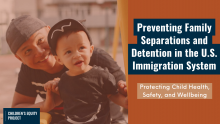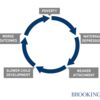0
Policy Brief
Community:
Mar 28, 2023
Family separations and family detention have been used as part of immigration enforcement in the United States. These practices and policies are severely detrimental to child health and wellbeing and can cause lasting harm.
This brief reviews the state of the research on the developmental, psychological, and physical toll of family separation and family detention on children and their caregivers. Grounded in this science, we provide a set of policy recommendations that protect child health and wellbeing.
Authored by: Kelly Edyburn, PhD & Shantel Meek, PhD for the Children's Equity Project
Topics: Child welfare, Early childhood, Health, Immigrants, Legislation & Policy, Mental health, Youth
 Shared by Sandra Ware
Shared by Sandra Ware
Sandra Ware posted a
on Mar 30, 2023
Kelly Edyburn, PhD & Shantel Meek, PhD for the Children's Equity Project
Family separations and family detention have been used as part of immigration enforcement in the United States.
0
Policy Brief
Community:
Nov 3, 2022
The series highlights the promising work of the EHS-CCPs to date, particularly related to pandemic recovery and stabilization, workforce support, and expanding access to holistic support for children and families, especially mental health support. The briefs highlight the many roles that states can play in establishing and expanding their own EHS-CCPs, including by using Preschool Development Grant Birth to Five funding and aligning CCDF quality funding with supports needed to establish and grow the Early Head Start model.
The EHS-CCPs take many forms in states and communities across the country, but all provide resources to child care partners to deliver high-quality services aligned with the holistic Early Head Start model. This includes ensuring access to early learning for infants and toddlers; vision, hearing and developmental screenings; connections to health supports, including mental and dental healthcare; supports for families — including connections to prenatal care and economic, education, housing, and health supports; and coaching and access to credentials and higher levels of education for the workforce. In some states, the EHS-CCPs have prompted important policy changes that align standards across these two programs, reducing the burden for communities and providers.
Check out the full series here and help us spread the word!
Authored by: Mario Cardona, Shantel Meek, Linda Smith, Yvette Fuentes, and Eric Bucher for Arizona State University Center for Child and Family Success
Topics: Child welfare, COVID-19, Health, Mental health, Workforce development
 Shared by Sandra Ware
Shared by Sandra Ware
Sandra Ware posted a
on Nov 3, 2022
Mario Cardona, Shantel Meek, Linda Smith, Yvette Fuentes, and Eric Bucher for Arizona State University Center for Child and Family Success
The series highlights the promising work of the EHS-CCPs to date, particularly related to pandemic recovery and stabilization, workforce support, and expanding access to holistic support for children and families, especially mental health support.
0
Report
Community:
Jan 31, 2019
For a very young child, the relationship with a primary caregiver, most often though not exclusively a mother, lays an important psychological foundation for later flourishing. Successful attachment and bonding in the first two years of life predicts healthy later development on a range of fronts, from mental health to educational skills. When bonding and attachment prove difficult, child development is affected. Recent advances in brain science allow this impact to be shown more clearly and more definitively.
Authored by: Richard V. Reeves for Brookings Institution
Topics: Child welfare, Depression, Dual-generation, Early childhood, Health, Low-income, Mental health, Mobility
 Shared by Mica O'Brien
Shared by Mica O'Brien
Mica O'Brien posted a
on Feb 5, 2019
Richard V. Reeves for Brookings Institution
For a very young child, the relationship with a primary caregiver, most often though not exclusively a mother, lays an important psychological foundation for later flourishing.
0
Report
Community:
Oct 24, 2018
CLPHA’s Housing Is Initiative is engaged in a number of cross-sector activities focused on developing partnerships, facilitating a community of practice, resource development, promoting best practices, online collaboration, policy and advocacy, and training and education. Read about recent activities in this Fall Update.
Authored by:
Topics: Child welfare, CLPHA, Community development, Cost effectiveness, Data sharing, Early childhood, Education, Family engagement, Funding, Health, Homelessness, Housing, Low-income, Medicaid / Medicare, Mental health, Partnerships, Place-based, Post-secondary, Research, Stability, Substance abuse, Workforce development, Youth
 Shared by Mica O'Brien
Shared by Mica O'Brien
Mica O'Brien posted a
on Oct 24, 2018
CLPHA’s Housing Is Initiative is engaged in a number of cross-sector activities focused on developing partnerships, facilitating a community of practice, resource development, promoting best practices, online collaboration, policy and advocacy, and training and education.
0
Case study
Community:
Jul 17, 2018
The South Lincoln Health Impact Assessment (HIA) focuses on the redevelopment master plan for the Denver Housing Authority’s South Lincoln Homes community in downtown Denver. The rapid HIA and masterplan was a four-month process that began in April 2009. The HIA identifies potential health impacts and recommends changes to optimize positive and minimize negative health consequences for the South Lincoln neighborhood. This assessment includes community demographic and socioeconomic information, identified potential health issues, interviews available surveys, and limited body measurement data along with supportive evidence-based research and recommendations that informed the HIA and masterplan design.
Authored by:
Topics: Child welfare, Community development, Disabilities, Dual-generation, Health, Housing, Low-income, Mental health, Metrics, Nutrition, Preventative care, Research, Safety
 Shared by Housing Is
Shared by Housing Is
Housing Is posted a
on Jul 17, 2018
The South Lincoln Health Impact Assessment (HIA) focuses on the redevelopment master plan for the Denver Housing Authority’s South Lincoln Homes community in downtown Denver. The rapid HIA and masterplan was a four-month process that began in April 2009.
0
Publication
Community:
Jul 12, 2018
Authored by:
Topics: Child welfare, Dental, Early childhood, Education, Exercise, Family engagement, Health, Housing, Medicaid / Medicare, Mental health, Nutrition, Partnerships, Place-based, Preventative care, Seniors, Vision
 Shared by Housing Is
Shared by Housing Is
Housing Is posted a
on Jul 12, 2018
0
Report
Community:
Jul 10, 2018
HUD Administrative Data Linked with the National Health Interview Survey
Authored by:
Topics: Attendance, Child welfare, Data sharing, Dental, Health, Housing, Low-income, Medicaid / Medicare, Mental health, Metrics, Racial inequalities, Vision
 Shared by Housing Is
Shared by Housing Is
Housing Is posted a
on Jul 10, 2018
HUD Administrative Data Linked with the National Health Interview Survey
1
News Article
Community:
Jul 3, 2018
Researchers have shown — and teachers know — that schoolchildren exposed to neighborhood violence can have a tougher time learning, experiencing more stress and depression than their peers growing up in safe neighborhoods. But a Johns Hopkins University sociologist discovered that the consequences of neighborhood violence reach further than previously known, even spilling over to students who come from safe neighborhoods. Using crime and student data from Chicago, Julia Burdick-Will linked exposure to neighborhood violence to a drop in test scores, an effect that extended to students coming from communities that experienced little or no violence.
Authored by: Moriah Balingit for The Washington Post
Topics: Attendance, Child welfare, Community development, Depression, Education, Health, Low-income, Mental health, Midwest, Out-of-school time, Post-secondary, Racial inequalities, Research, Youth
 Shared by Mica O'Brien
Shared by Mica O'Brien
Mica O'Brien posted a
on Jul 3, 2018
Moriah Balingit for The Washington Post
Researchers have shown — and teachers know — that schoolchildren exposed to neighborhood violence can have a tougher time learning, experiencing more stress and depression than their peers growing up in safe neighborhoods.
1
Video
Community:
May 23, 2018
The Council of Large Public Housing Authorities (CLPHA) hosted The Housing Is Summit in Washington, D.C., on May 3-4, 2018 with 300 partners across the housing, education, and healthcare sectors. Access video recordings of the Summit's keynote speakers (HUD Secretary Ben Carson, John Bridgeland, Matthew Morton), plenary panels (on topics that cut across sectors like anchor institutions, data collaboration, stability, and foundation investments), and select breakout sessions focused on the intersections of housing, education, and health.
Authored by: Council of Large Public Housing Authorities
Topics: Affordable Care Act, Attendance, Child welfare, CLPHA, Community development, Data sharing, Dual-eligibles, Dual-generation, Early childhood, Education, Funding, Grade-level proficiency, Health, Healthy homes, Homelessness, Housing, Legislation & Policy, Low-income, Medicaid / Medicare, Mental health, Metrics, MTW, Out-of-school time, Partnerships, Place-based, Preventative care, Racial inequalities, Research, School-readiness, Seniors, Stability, Substance abuse, Supportive housing, Sustainability, TA, Workforce development, Youth
 Shared by Steve Lucas
Shared by Steve Lucas
Steve Lucas posted a
on May 23, 2018
The Council of Large Public Housing Authorities (CLPHA) hosted The Housing Is Summit in Washington, D.C., on May 3-4, 2018 with 200 partners across the housing, education, and healthcare sectors. The Summit highlighted the ways that we can transform systems to better serve low-income people with two days of plenary speakers/panels, breakout sessions, and caucus discussions geared toward intersectional thinking and ways to take action.
Council of Large Public Housing Authorities
The Council of Large Public Housing Authorities (CLPHA) hosted The Housing Is Summit in Washington, D.C., on May 3-4, 2018 with 300 partners across the housing, education, and healthcare sectors.


 Shared by Sandra Ware
on Mar 30, 2023
Shared by Sandra Ware
on Mar 30, 2023

 Shared by Sandra Ware
on Nov 3, 2022
Shared by Sandra Ware
on Nov 3, 2022


 Shared by Housing Is
on Jul 17, 2018
Shared by Housing Is
on Jul 17, 2018
 Shared by Housing Is
on Jul 12, 2018
Shared by Housing Is
on Jul 12, 2018
 Shared by Housing Is
on Jul 10, 2018
Shared by Housing Is
on Jul 10, 2018
 Shared by Steve Lucas
on May 23, 2018
Shared by Steve Lucas
on May 23, 2018